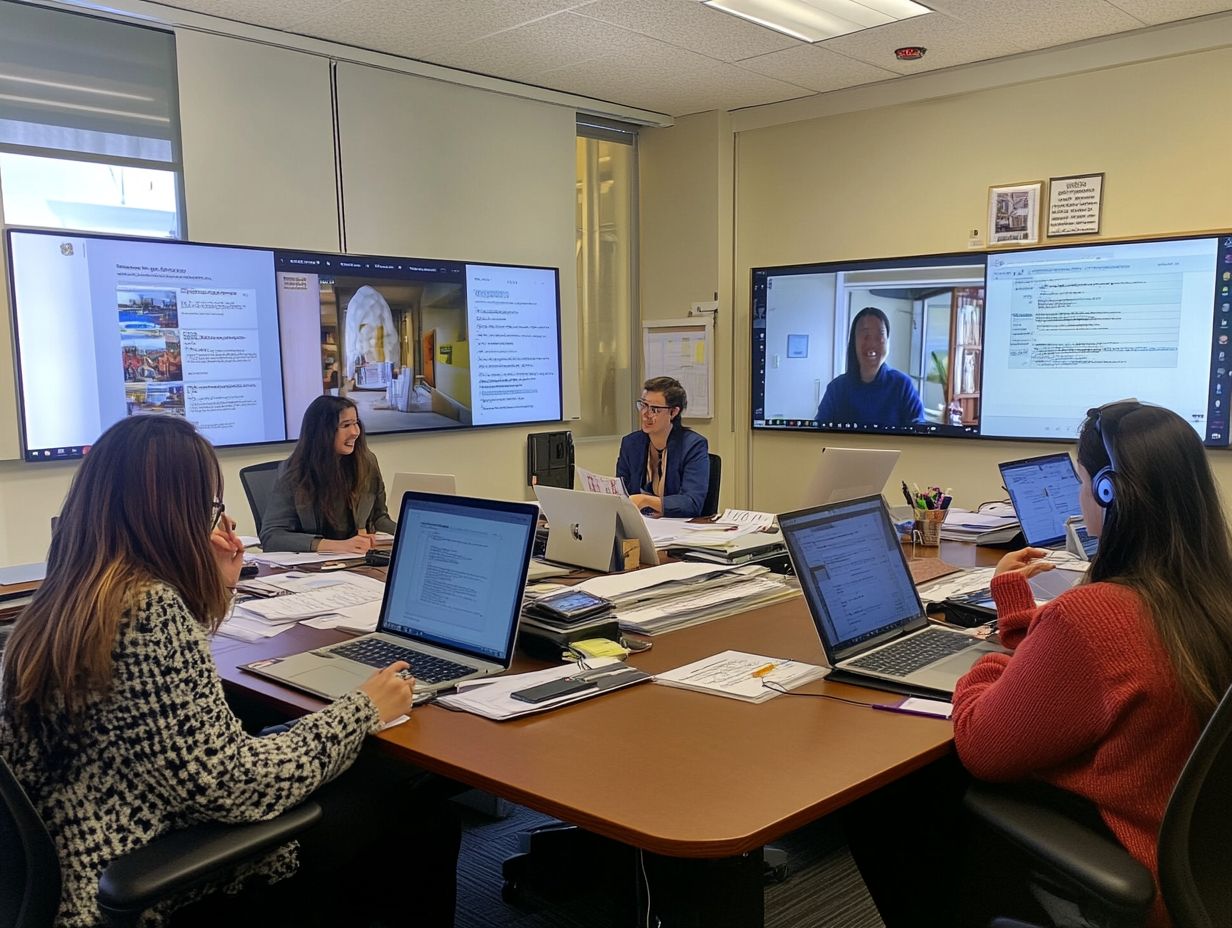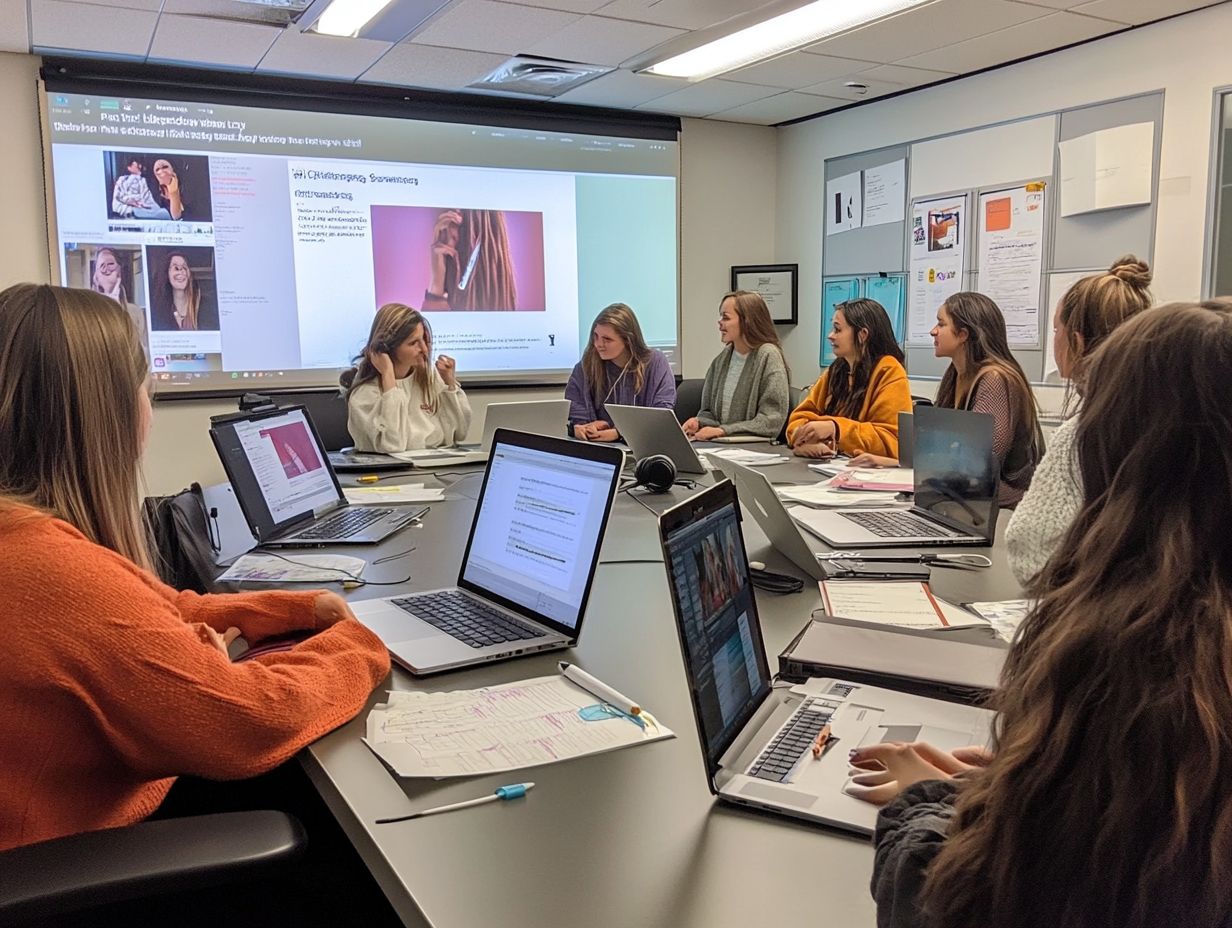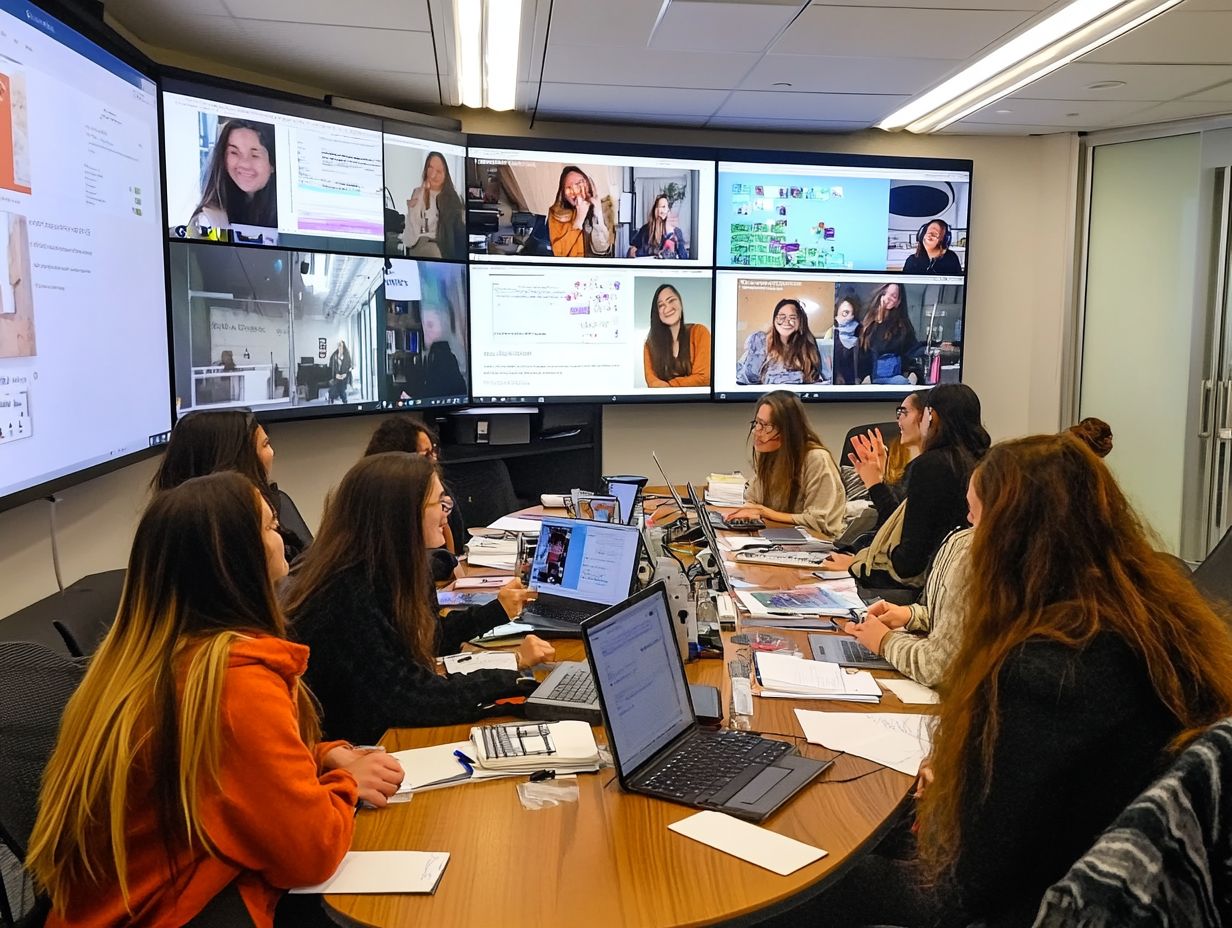How Do Online Courses Handle Group Projects?
In the realm of online education, group projects have become essential. They offer you the chance to collaborate and learn from your peers.
However, these projects come with their own set of challenges think communication hurdles, time management dilemmas, and accountability issues.
This article delves into the intricacies of group work in online courses. It provides practical strategies for successful collaboration, insights into assessment methods, and best practices to ensure productive teamwork.
Whether you re a student or an educator, grasping these dynamics can significantly enhance your online learning experience. Let s embark on this journey together as we navigate the complexities of group projects in the digital classroom.
Contents
Key Takeaways:

- Effective communication is key.
- Time management helps overcome collaboration challenges.
- Use tools like Zoom and Google Workspace for better teamwork.
- Assess contributions and resolve conflicts for fair grading.
Overview of Online Learning and Group Work
Online learning has changed the education landscape. Now, you can engage in group projects that build essential teamwork skills. As institutions like Florida Gulf Coast University and the University of Illinois embrace this trend, you ll find yourself increasingly collaborating in virtual teams.
This shift offers both opportunities and challenges. Effective communication and clear project requirements are crucial for success.
With the rise of online education, the importance of teamwork has never been more apparent. Courses like the University of Southern California s online MBA program showcase collaborative projects that closely mirror real-world business scenarios.
This evolution is supported by collaboration tools such as Zoom, Google Workspace, and Trello. These tools facilitate seamless coordination among you and your team members.
Use these platforms to navigate different viewpoints and sharpen your teamwork skills. By leveraging these tools, you ll learn to master conflict resolution while enhancing your interpersonal skills. These experiences equip you for future job challenges and help build camaraderie, paving the way for innovative problem-solving in our interconnected world.
Challenges of Group Projects in Online Courses
Group projects in online courses can pose distinct challenges for you, primarily stemming from communication hurdles and the challenges of managing time.
As part of a virtual team, you may encounter obstacles such as maintaining accountability and ensuring every member fully grasps the project requirements. This can lead to potential conflicts and inefficiencies within group dynamics, making the collaborative process even more complex.
Communication and Coordination Issues

Effective communication and coordination are crucial for the success of your group projects in online courses, yet they often come with their own set of challenges.
You need to leverage various collaboration tools, like Zoom and discussion boards, to ensure clear communication and enhance interaction within your virtual teams. These tools are essential because misunderstandings can easily arise in the absence of face-to-face interaction.
For example, the lack of non-verbal cues may lead to misinterpretations of tone or intent in your messages, leaving team members feeling disconnected or frustrated.
Time zone differences can complicate your scheduling for meetings, so it’s vital to establish a clear communication plan right from the start.
Utilizing platforms like Slack or Google Docs can further streamline your collaboration, allowing for real-time updates and seamless document sharing.
By fostering open dialogue and encouraging regular check-ins, you can build rapport with your team and effectively navigate the online learning environment.
Time Management and Accountability
Time management and accountability are vital for your success in group projects within online courses. By establishing a clear project timeline, you boost productivity.
Engaging in effective task delegation is essential. Ensure that responsibilities in your group are well-defined, while regular check-ins keep everyone on track.
Structured deadlines and milestones create a sense of urgency that motivates everyone to maintain momentum. When you set clear expectations for each phase of the project, transparent communication flows naturally during routine meetings.
To address any potential time-related challenges, adopt tools like shared calendars and project management software tools that help organize and track project tasks allowing you to monitor progress in real time.
Designating a project coordinator can also be a game-changer. This person ensures that everyone sticks to the timeline while addressing any concerns as they arise. This approach leads to a cohesive group effort, maximizing your potential for success.
Strategies for Successful Group Projects in Online Courses
Implementing effective strategies is crucial for the success of group projects in online courses, especially regarding communication and the use of virtual collaboration tools.
By leveraging project management techniques and ensuring that all group deliverables align with learning goals, you significantly enhance productivity and achieve your objectives.
Effective Communication Techniques

Effective communication techniques are essential for fostering collaboration in online group projects. Incorporating icebreaker activities significantly enhances team dynamics.
Regular group meetings and using discussion boards for project feedback help maintain engagement and ensure alignment with the project’s objectives.
These strategies encourage participation and create a sense of belonging among participants. Icebreakers are particularly useful for breaking down initial barriers, allowing team members to express themselves more freely.
Regular check-ins offer valuable opportunities to address concerns and celebrate small achievements, cultivating a positive atmosphere.
Get ready to boost your project s success with feedback tools! Implementing feedback mechanisms, like anonymous surveys or open forums, enables constructive criticism that provides insights to propel the group’s success.
Ultimately, these techniques can transform a disparate group of individuals into a cohesive team, effectively increasing both productivity and satisfaction.
Virtual Collaboration Tools
Virtual collaboration tools are essential for enhancing group projects in your online courses. They allow you to communicate effectively and manage tasks with ease.
Platforms like Google Hangouts and Zoom are video calling tools that let you meet and discuss your project in real time. Specialized project management tools help you stay organized and focused on your objectives.
These tools streamline communication and cultivate a sense of community that can often be absent in virtual settings. Features like screen sharing, file uploads, and interactive whiteboards enable you and your peers to brainstorm ideas together.
Task assignment and deadline tracking ensure everyone remains accountable. The integration with other applications further boosts their usefulness, creating a comprehensive approach to project execution.
By offering a structured framework for collaboration, these resources elevate your online learning experience, transforming isolated tasks into engaging, cooperative endeavors.
Assessment and Grading of Group Projects in Online Courses
Evaluating group projects in online courses poses a unique challenge. It is essential to balance individual contributions with the overall group deliverables.
To navigate this complexity, establish clear grading criteria. This ensures a fair assessment of performance while recognizing the importance of both collaboration and individual accountability.
Fostering a more effective learning environment values the efforts of each participant while appreciating the synergy of the group as a whole.
Evaluating Individual and Group Contributions

Evaluating individual contributions and group performance is crucial in online education. It fosters accountability among team members.
You can use various assessment methods, such as peer evaluations and self-assessments, to understand each student’s involvement in group projects.
These tools clarify each participant s role and prompt reflection on your own learning and collaborative skills. Using grading guides is another effective technique, providing clear performance criteria and expectations.
Consider using reflective journals. Students can document their experiences and contributions, providing valuable insights into group dynamics.
Online quizzes or participation tracking can also serve as indicators of engagement, ensuring that everyone is actively involved in the learning process. Implement these strategies to enhance accountability, leading to a more productive and inclusive educational environment.
Addressing Group Conflicts and Issues
Addressing group conflicts and issues is essential in managing online group projects. Unresolved conflicts can significantly hinder team dynamics and stall project progress.
Implement a structured approach to conflict resolution to provide constructive feedback and facilitate open communication. This leads to more cohesive group interactions.
In an online setting, you might encounter various conflicts, such as miscommunication, differing priorities, and role ambiguity. These issues often arise from the absence of face-to-face interaction, making it crucial to adopt effective communication strategies and leverage technology.
Regular check-ins, clearly defined responsibilities, and establishing a platform for feedback are vital. By ensuring every team member feels heard and valued, these techniques not only resolve existing issues but also cultivate trust and collaboration, ultimately enhancing overall project performance.
Best Practices for Online Group Projects
Implementing best practices for online group projects is crucial for achieving successful outcomes and fostering meaningful collaboration.
Prioritize strategic project management and promote group reflection to ensure your team remains aligned with its learning objectives, ultimately enhancing overall productivity.
This approach streamlines workflow and enriches the collective experience, leading to more impactful results. Implement these best practices today to achieve successful outcomes and meaningful collaboration.
Tips for Facilitating Productive Group Work
Facilitating productive group work requires a careful approach to managing projects. Ensure task descriptions are clear and schedule regular meetings to keep everyone involved.
Use online collaboration tools to manage your workflow and boost your team s performance.
For an efficient group dynamic, everyone must understand their responsibilities and deadlines from the start. Establish a central place for documents and communication to keep everyone updated.
Schedule regular check-ins. This allows the group to discuss progress, tackle challenges together, and keep the project on track.
This ongoing dialogue fosters accountability and encourages all members to participate, leading to a strong team effort and excellent project results.
Frequently Asked Questions
- How do online courses handle group projects?
Online courses typically use virtual platforms like discussion forums or video conferencing to facilitate group projects. This allows students to collaborate and communicate, even from different locations. - Are group projects mandatory in online courses?
It depends on the course and instructor. Some may have only individual assignments, while others mix individual and group projects. Always check the syllabus for specific requirements. - How are group roles and responsibilities assigned in online courses?
Roles can be assigned by the instructor or chosen by group members. This ensures everyone has a specific responsibility and contributes to the project s success. - How do group members communicate and collaborate in online courses?
Members may use email, instant messaging, discussion boards, or video calls. Establish clear communication channels and set expectations for response times. - How does online group work affect individual grades?
Grades may be based on the overall group project and individual contributions, sometimes influenced by peer evaluations. - How are conflicts resolved in online group projects?
Open and professional communication is key. Many courses provide guidelines for resolving conflicts, and instructors may mediate if needed.






